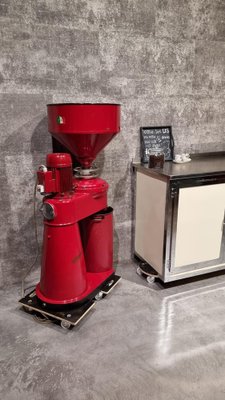A New User's Guide to Industrial Coffee Grinder Options
A New User's Guide to Industrial Coffee Grinder Options
Blog Article
Industrial Coffee Grinder Guide: Boost Efficiency and Top Quality
In the competitive landscape of coffee production, picking the ideal commercial coffee mill plays an essential duty in improving both effectiveness and product top quality. Comprehending the subtleties of different grinder kinds and crucial attributes-- such as customizable grind setups and durable building and construction-- can dramatically influence the last flavor profile of the coffee. Additionally, the optimization of the grinding procedure, paired with persistent maintenance, is essential for sustaining efficiency gradually. As we check out these vital elements, it becomes apparent that the effects expand past mere devices selection, impacting general company success in manner ins which require closer evaluation.
Comprehending Grinder Types
When choosing an industrial coffee grinder, understanding the numerous types readily available is important for optimizing both taste extraction and functional effectiveness. The two main sorts of grinders are blade grinders and burr mills. Blade grinders use sharp blades that slice coffee beans right into irregular sizes, bring about unequal extraction and potentially undesirable tastes. While blade grinders are often a lot more affordable and suitable for small procedures, they are normally not recommended for industrial use.

Eventually, selecting the right sort of mill is integral to preserving quality and effectiveness in coffee production, making it important for services to spend in high-grade burr mills for optimum results.
Key Features to Consider
Selecting a commercial coffee grinder needs mindful consideration of a number of crucial attributes that can considerably influence both efficiency and the overall coffee experience. Among the main facets to assess is the grinding system. Burr grinders are typically chosen over blade grinders, as they give a consistent grind size, which is critical for optimal removal and flavor.
An additional important feature is the mill's ability. A functional mill with numerous settings allows you to tailor the work size to various brewing approaches, improving the coffee's taste profile.
The building material additionally contributes in sturdiness and upkeep. Stainless steel components often use durability and are less complicated to cleanse, which is vital for maintaining hygiene requirements. Finally, review the mill's sound degree, specifically in a busy coffee shop or manufacturing atmosphere, where excessive sound can be disruptive. Purchasing a mill that balances these functions can significantly boost both operational performance and the quality of the coffee served.
Optimizing Grinding Refine
To achieve the ideal outcomes in coffee prep work, optimizing the grinding process is essential. The work size significantly influences extraction, flavor, and overall top quality of the made coffee.


Additionally, checking the grinding rate can enhance the process. Slower grinding usually creates less warm, preserving fragile flavors and aromas. Conversely, much faster grinding may generate excessive warmth, negatively impacting the coffee's high quality.
Maintenance and Care Tips
Proper maintenance and treatment of commercial coffee grinders are crucial for making certain ideal performance and long life. Regular cleansing is the foundation of maintenance; residue build-up can impact flavor and grinding efficiency. It is recommended to cleanse the mill after each use, wiping down the exterior and removing any kind of click over here now coffee premises from the burrs.
Furthermore, examine the grinding burrs for deterioration. Plain burrs can jeopardize grind consistency, so they must be changed as essential. Industrial Coffee Grinder. Regularly calibrating the grinder is likewise critical, as this preserves the wanted work size for various developing techniques
Lubrication of moving components ought to be performed according to the supplier's requirements, as this reduces rubbing and lengthens the life of the tools. It is vital to use food-grade lubes to ensure safety and security and compliance with wellness guidelines.
Lastly, maintain the grinder in a steady and dry environment to stop rust and deterioration. By adhering to these upkeep and care tips, operators can enhance the performance of their industrial coffee grinders while ensuring premium output and expanded operational life.
Roi Analysis
Reviewing the return on financial investment (ROI) for industrial coffee grinders is critical for companies seeking to enhance their coffee manufacturing abilities. A comprehensive ROI analysis aids identify the economic feasibility of buying premium grinders, permitting companies to evaluate the initial prices against possible gains.
To carry out an extensive ROI evaluation, services need to take into consideration numerous essential variables. Evaluate the purchase rate of the grinder, including installment and any kind of essential alterations to existing infrastructure. Next, determine operational expenses, including energy consumption, maintenance costs, and labor performance improvements. High-performance grinders often lead to reduced grinding time and enhanced throughput, which linked here can considerably improve efficiency.
Additionally, think about the influence on product top quality. Industrial Coffee Grinder. Superior grinders yield a more constant work dimension, which can boost taste accounts and customer satisfaction, inevitably driving sales. By increasing the quality of the end product, services can justify higher rates, causing enhanced earnings
Conclusion
In summary, a commercial coffee grinder plays a critical function in boosting both performance and item top quality within coffee manufacturing. By picking high-grade burr mills equipped with essential attributes such as flexible work settings and durable construction, businesses can ensure optimal taste extraction. Furthermore, regular maintenance is important for maintaining grinder efficiency and maximizing client complete satisfaction. Ultimately, the tactical financial investment in a reputable mill contributes considerably to improved earnings and competition in the coffee market.
In the affordable landscape of coffee manufacturing, choosing the appropriate industrial coffee mill plays a crucial role in improving both performance and item quality. The 2 primary types of mills are blade mills and burr grinders. Within the burr mill group, there are flat burr grinders and cone-shaped burr mills, each with its benefits. Burr grinders are generally preferred over blade mills, as they supply a consistent grind dimension, which is critical for optimum removal and flavor.
In summary, a commercial coffee grinder plays a crucial duty in improving both efficiency and product high quality within coffee production.
Report this page